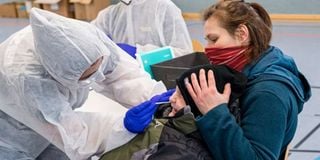Breaking: Autopsy reveals how Cyrus Jirongo died
Premium
Report explains mystery behind fewer children contracting Covid-19

A medical staff takes a rapid antigen test on a boy in a sports hall in Hildburghausen, Thuringia, eastern Germany, on December 2, 2020, during the ongoing Covid-19) pandemic.
What you need to know:
- The researchers found that roughly 5 per cent of 302 uninfected adult participants had antibodies that recognise the SARS-CoV-2 virus.
One child (male, nine years) developed a mild cough, sore throat, abdominal pain, and loose stools, and the second child (male, seven years) developed mild cough.
Six in every 10 children are immune to Covid-19, a report by the Global Alliance for Vaccines and Immunisations (Gavi) reveals.
The results published in the Science Journal looked at people who had never been exposed to the new coronavirus for pre-existing antibodies that bind to the spike protein on the surface of the SARS-CoV-2 virus.
They also looked at whether those antibodies had an effect on the way the SARS-CoV-2 virus infects cells.
The researchers found that roughly 5 per cent of 302 uninfected adult participants had antibodies that recognise the SARS-CoV-2 virus.
By comparison, as many as 62 per cent of uninfected children aged six to 16 years had antibodies, the age group in which antibodies to seasonal coronaviruses are most common.
In laboratory tests, they found that pre-existing antibodies also stopped the SARS-CoV-2 virus from entering cells. The spike protein has two subunits, S1 and S2, and the researchers found that S2 was most similar across coronaviruses and this is most likely where cross-reactive immunity stems from.
Covid-19 symptoms
Researchers followed a couple who had Covid-19 symptoms, including cough, fevers, followed by lethargy and headache for 14 days (mothers) and 11 days (fathers) seven days after the onset of the parents’ symptoms.
One child (male, nine years) developed a mild cough, sore throat, abdominal pain, and loose stools, and the second child (male, seven years) developed mild cough.
The third child (female, five years) was asymptomatic. Eight days after the onset of the symptoms, the parents were SARS-CoV-2 PCR positive on nasopharyngeal (NP) swabs taken the same day.
Repeated NP swabs from the children were negative for SARS-CoV-2.
Physical distancing precautions were not feasible in the household. Child 3 had particularly close contact, sleeping in the parents’ bed throughout the period both parents were unwell. All family members recovered fully without requiring medical care.
Infected parents
This shows that three children repeatedly exposed to SARS-CoV-2 in their household mount cellular and antibody-mediated immune responses similar to their infected parents and specific to SARS-CoV-2, without virological confirmation of infection.
To date, children represent a small proportion of SARS-CoV-2 confirmed Covid-19 cases. They are predominantly infected from symptomatic household adult contacts.
“Children have comparatively milder Covid-19 disease and up to one-third are asymptomatic; the immunological basis for milder paediatric disease is unclear, but may be relevant to other viral pandemics where striking age-related epidemiological differences were observed,” says the report.
Out of the 90,305 Covid-19 cases recorded so far in the country, less than 4,000 cases comprise children between 10 years and below.
The results mean that since children are far more likely than adults to have antibodies against Covid-19, this might explain why they are often unaffected by the virus that causes Covid-19 or only have mild illness.
New immunity
The researchers suggest that differentiating between pre-existing and new immunity to SARS-CoV-2 will be important in understanding our response to a Covid-19 vaccine and our susceptibility to the virus.
“Investigating immune responses to SARS-CoV-2 across all age groups is key to understanding disease susceptibility, severity determinants, and vaccine candidates adding that detailed investigations of immune responses during SARS-CoV-2 infection have been reported in adults while data on immune responses in children exposed to SARS-CoV-2 are limited,” states the report.
Yesterday, the country lost yet another 14 patients to Covid-19, bringing the cumulative fatalities countrywide to 1,582.
Some 673 (645 Kenyans and 28 foreigners) tested positive for Covid-19 from a sample of 8, 230 bringing the caseload to 90,978.
The ministry said 992 patients are recuperating in various health facilities and 7,887 are on home-based care programme. Out of the admission, 97 patients are severely ill and are on oxygen. The cases were distributed in 33 counties with Nairobi leading at 211 cases, Nakuru 113, Kilifi 61, Busia 41, Migori 34, Bungoma 33, Mombasa 32, Kiambu 21, Kakamega and Nyeri 17 cases each. Nyamira 15, Meru and Kirinyaga 12 cases each.
Additionally, 325 patients have recovered from the disease bringing the total recovery to 71, 579 patients.





